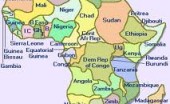Molly Minturn - My family is heartbroken to share that my father died in surgery on Monday, Feb. 10. It…
Wednesday Night #1339
Written by Diana Thebaud Nicholson // October 31, 2007 // Catherine Gillbert, David Kilgour, David/Terry Jones, Kimon Valskakis, Reports, Rights & Social justice, Ron Meisels, Wednesday Nights // 1 Comment

31 October 2007
The Report by Catherine Gillbert
David Kilgour was welcomed back and congratulated on the easy-flowing style and good editing of his latest book Uneasy Neighbo(u)rs Canada, The USA and the Dynamics of State, Industry and Culture which he co-wrote with Wednesday Nighter David Jones. [As the publisher does not believe in book launches, the authors have been restricted to giving a number of interviews only]. He emphasized that David Jones was a pleasure to work with despite his firm (immovable) opinions. Twelve subjects – emerging issues – including multilateralism versus unilateralism, education, resources, economy, are compared, and how the two countries approach these issues is discussed. David K. said that as a result of this work he is even prouder of this country which he found superior to the US on more than half the topics considered.
We should be extremely proud of this country, but too many Canadians have this wretched inferiority complex – only people who are new to the country appreciate it
One overt sign of the inferiority complex is the constant bashing of the United States which is a great country
It did leave him wondering why we do not give our first nations more autonomy, at least as much as we give Québec.
It was generally agreed that one Canadian weakness is not taking care of infrastructure. It would be a wise investment to spend on health care and education
The publisher of David K’s next book, Bloody Harvest on China and the pillaging of organs from the members of the Falun Gong, which he co-wrote with David Matas, has decided against publication for fear of liability. The Chinese Medical Association has just stated that no more organs will be available to foreigners – an implicit recognition of the truth of David’s contentions. The report is available on the Web in 19 languages.
China
David Kilgour mentioned the recent book by Peter Navarro The Coming China Wars: Where They Will Be Fought and How They Can Be Won (who has also written extensively on investment strategy). The author points out that as China undergoes transition from Communism to capitalist imperialism, government and industry have forged strong bonds that allow them to exploit slave labor to produce goods of questionable quality and ignore environmental and economic constraints that hamper other nations.
Should the West boycott travel to China to protest the human rights abuses? The government is waging war on its own people – terrible air quality in the cities, polluted water that cannot be used for agriculture, stories of corruption everywhere. The dominant Han are being moved to all outlying regions in an attempt to keep things under control.
In addition, there is the international role of China in aiding and abetting repressive regimes (probably every monk shot in Burma last week was shot by a Chinese bullet from a Chinese rifle) including Sudan and Darfur. The past week’s triumphal visit of the Dalai Lama to Ottawa also reminds us of the little-understood, shameful role of China in Tibet in 1959.
Discussion of China’s role in Darfur was further stimulated by a video clip of an interview with Professor Eric Reeves on prospects for the Sudan peace talks
Canadians do not know what to do about China. They consume cheap goods while decrying the human rights abuses that allow the cheap goods to be produced. Many felt that we should stand up and publicly state our position on China’s human rights and boycott all products produced there. It was also suggested that the Export Development Corporation should stop investing in companies that are moving jobs to China.
China’s attitude to the West is that we are spoilt stupid people and they are going to keep on doing exactly what they want to. Their problem is 800 million country people who have not benefited from the economic growth. There have been many demonstrations and many people have been gaoled. One lake supplies water to 300 chemical plants and the water is too polluted to treat to use for drinking or agriculture. There is no public healthcare system now as there was under Communism.
The top few stocks in China, e.g. , PetroChina (with virtually the largest market cap in the world), are performing well. On a macro level, China is sucking up businesses from all over the world (67,000 textile jobs lost to China by South Africa) and becoming self-sufficient. Eventually, China’s growth will be less dependent on the outside world and more driven by internal consumption; as this goal is approaching, the lot of the average (urban) Chinese is improving.
At some point, will the poor quality of Chinese goods stop further jobs going there?
Rwanda
Opinions are very mixed on Romeo D’Allaire: hero or tragic figure? To some, his ability to save many hundreds of Tutsis despite no resources was heroic, to others his breakdown was caused by his own sense of failure. Being a witness does not make one a hero. He never went to the Prime Minister or the Secretary-General of the UN to ask for help, always sticking to the proper channels. He could have stuck his neck out. Despite complaining about the Liberals’ lack of action on Darfur, he was happy to accept a Senate seat from Prime Minister Martin.
When General D’Allaire was trying to convince the world of the seriousness of the problems in Rwanda, he was ‘competing’ with the O.J. Simpson trial in the news. Nobody was paying attention to Rwanda.
Afghanistan
While Prime Minister Harper has the right instincts about Canada’s international military role, he and his government are not good about getting the message out, and should be honest about how long it will take to bring democracy to Afghanistan. The Russians killed 1 million Afghanis, lost 54, 000 men and still failed to effect regime change. The coalition managed to do that in 90 days.
Do Canadians have the stomach for such a war?
Do we have the moral responsibility to fight a righteous war? If so, then where is our moral responsibility to support emerging economies, fight against climate change which will not affect Canada particularly adversely, but will have a terrible impact on the countries who can least afford it (and had the least to do with causing it), or unsustainable agriculture in Africa?
When is intervention justified? Is regime change a valid reason for intervention?
Mini Budget
What do we spend money on? We don’t spend money on national defense (one of Jean Chrétien’s ways of balancing the budget – or a least improving the situation – reasoning that the U.S. would defend Canada anyway). We can’t patrol an open Arctic and don’t know what’s going on there.
The process of developing the budget on the basis of “we have a surplus, ratio of debt to GDP is 25%” seems illogical. Why bring down the deficits if we need to spend the money on infrastructure? The cost of everything, especially construction, is going up faster than inflation at a time when Canada can borrow money at 4-4½%; we would be much better off borrowing the money, running a deficit and spending the money on the country at a time when the cost of infrastructure is rising 10-12%.
Lowering the GST is a political rather than an economic move. It is a highly inefficient but lucrative tax that turned around the national debt. While it may be the right instrument to control the economy, but you don’t lower it when the economy is booming. It should be buried in the price of goods, as in Europe, it could be increased with a concurrent lowering of income tax (to which people are much more sensitive).
The markets
Ron Meisels : We are on the verge of another Bull market. Oil stocks are rising, High-tech stocks in the US are breaking out, Worthington, EMC – market climbs when people are worried. But there is another shoe to drop thanks to the ABC Paper.
Emerging markets: Some think these are risky, but so are developed markets. They have performed better than US equities with about the same volatility. Their growth is supported by domestic demand. These countries have young populations that are growing. In 15 years 85% of population and 50% 0f capitalization will be in the developing world. The 8 largest emerging markets contribute as much to global growth as do the G7. Saving rates are 30% in the developing world compared to 0% in U.S. Developing world countries are net creditors, while the developed world is where we find the debtor nations, which will translate into currency appreciation vis à vis the US dollar and the euro. Next year, Canada’s exports (commodities and some high-tech products) to the emerging markets will increase by 25%, while exports to the developed world will increase by O.
Athens April 2-5 2008: Kimon gave an update on the new School of Athens (NSOA) conference What makes globalization work for the benefit humanity? Eight round tables on current issues based on case studies will aim to find best practices and strategies for future development, with emphasis on feasible strategies and solutions. While the program essentially remains as before, a new topic,- management of natural disasters-, has been added. For updates and more information, please see the new NSOA website
National politics
Will there be a federal election soon? How long can the Liberals continue to abstain or absent themselves from votes in the House on bills that Mr. Harper will continue to designate as votes of confidence? The most recent polls, with the LPC at 19% in Québec indicate that the party might win only 8 seats in Québec. Given this outlook, it is hard to believe that Mr. Harper would not trigger an election within the next few weeks. Now that there is a fixed date for elections, in the view of many, it would be best for the country if the minority government were to reach the date in 2009. If, however, the government (whether majority or minority) falls, there is a formula whereby the next fixed election date will be four years from the date of election of the (new) government. There is a possible amendment that would provide that after 2009, if a minority government is elected, it cannot fall for four years: in other words, minority governments would be held to governing for four year. The crux of the problem is the confidence motion which, in the opinion of some has become a farce – in Canada, anything can be a confidence vote. [In other words, as it stands now, in rather typical Canadian fashion, we have a sort-of fixed election date.]
The Climate 2050 Conference of last week, spearheaded by Pierre Marc Johnson was exceptionally interesting, very well organized and a showcase for much Canadian talent in the policy and practical arenas. It focused on finding feasible solutions. A particularly informative session focused on Urban Planning and Transportation. Papers will be posted shortly on the Conference website and will be of interest to many Wednesday Nighters.
Michael Judson telephoned with the news of the Business for the Arts award to Bluenote. He was in Toronto on October 22 to receive the award and said it was a very emotional occasion for him. Blue Note Mining Inc. received the First Dance Award for their first foray into the arts world as the biggest corporate sponsor of Infinitheatre.
The Prologue
Hobgoblins, bats, black cats and jack o’ lanterns may not be present, (depending on your views of the other habitués of Wednesday Night) but there will be a steaming brew of stimulating thought in the company of David Kilgour, Kimon Valaskakis, Hans Black, and Beryl Wajsman to stir the pot. Given the likely topics, there will certainly be more scary matter inside 33 than in the streets of Montreal on Hallowe’en.
Among the topics we can expect to consider:
Pessimism grows over Darfur talks
Crippled by the absence of key rebel leaders, a highly anticipated Darfur peace conference was effectively postponed Sunday to give rebel delegates time to prepare before direct negotiations with the Sudanese government.
French FM Kouchner Proposes Fund to Push Democratic Change in Burma while Burma’s military government stepped up its propaganda campaign against the United States on Sunday, accusing Washington of inciting last month’s pro-democracy demonstrations in hopes of installing a puppet government. Also worth reading is the piece by the Burma Solidarity Collective in the McGill Daily
What happens when an authoritarian government and thousands of activists go head-to-head at the Olympics? China is about to find out.
Meanwhile it is reported that the Chinese government has arrested 774 people over the last two months as part of a nationwide crackdown on the production and sale of tainted food, drugs and agricultural products.
One cannot help but wonder whether those arrested are the ones who are really responsible.
Turkey [continues] to bomb Kurdish rebel positions in the east of the country, but the New York Times reports that the PKK is operating freely with little sign of any constraints from Iraqi Kurdish leaders. Condoleezza Rice is expected in Istanbul this week for talks, but likely the situation will be resolved temporarily when winter comes and the mountain passes close.
We recommend the Stratfor Analysis “Turkey as a Regional Power” as excellent background for the dilemma the U.S. faces in this conflict, along with Turkey’s EU membership argument on the BBC in early October.
The Bush administration last week proceeded with its controversial decision to brand the Quds unit of the Revolutionary Guards as a terrorist organization and impose new sanctions on Iran. Israeli officials have welcomed this American escalation of pressures on Iran, apparently considering it a foreign-policy achievement for Israel, as well as for the formidable array of pro-Israel US pundits who push for a combative policy against Iran.
Iran’s leaders need enemies like Bush . George Bush retains almost unchallengeable mastery of the greatest military arsenal on earth. There seems a real prospect that he will use this to cripple Iran’s nuclear programme.
As the world watches and waits for a spark to set off a conflagration in any one of these countries, King Abdullah al-Saud will enjoy a Royal Visit to Great Britain with all the appropriate pomp and circumstance. Not everyone is impressed, as some point to flagrant human rights abuse in Saudi Arabia with little sign of any reform and a concurrent flow of funds to Wahabbi-Islamist extremists
Closer to home, there’s Minister Flaherty’s economic update following the Loonie’s 47-year high of $1.05
Poor Bombardier: SAS abandons Bombardier Q400 after incidents and shares sink after third incident involving landing gear while the European Aviation Safety Agency (EASA) called Monday for “an immediate crisis meeting” with officials from Transport Canada and Bombardier Inc to explain three crash-landings by the turboprop aircraft.
And there’s the on-going discussion of Alberta’s new oil & gas royalty structure that “poses no threat to producing projects, and U.S. officials [should] have no concerns about changes to the fiscal regime, according to the energy minister” while Oil prices hit a new trading high above $93 a barrel Monday before falling back, propelled by news that Mexico’s state oil company, PEMEX, was suspending about a fifth of its oil production due to a storm.
Finally, we are sad to report that one of our favorite projects, the Nicholas Negroponte $100 Laptop appears to be losing steam. Its price tag is now $200 as the economies of scale he had predicted have not materialized.




One Comment on "Wednesday Night #1339"
November 9, 2007
Stocks Edge Lower on Deepening Credit Worries
By MICHAEL M. GRYNBAUM, New York Times
Stocks declined today after another large bank said it would write down the value of some of its assets, reigniting fears of a credit squeeze. The Dow Jones industrial average plummeted 204 points, or 1.5 percent, early in the day before pulling back as technology stocks extended their losses. …
Technology stocks, which suffered one of their first significant sell-offs in months yesterday, dropped another 2.3 percent in morning trading. Qualcomm, the wireless company, said last night that it expected business to drop over the coming months, underscoring fears that technology companies will be hurt by an expected slowdown in the economy over the next few months. Cisco Systems, the networking giant, ignited yesterday’s sell-off with a similar report. The Nasdaq composite index, heavy with technology shares, was down 39 points, or 1.5 percent, to 2,655.54 at 2:30 p.m.